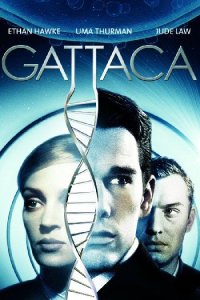Gattaca has a few nice moments. They pop up every now and again to remind you how silly the rest of the movie is. Take its message. It isn’t the usual science fiction pablum of how humanity is superior to any given alien race. No, this is a story about genetic engineering. So, instead, we discover that humanity is superior even to its modified self. Or at least just as good. It tells us we could be Beethoven, too, if we only worked hard enough.
Ethan Hawke plays our hero, Vincent Freeman. (Subtle, isn’t it?) He’s dreamed of going into space since he was a kid, despite the fact that his parents had him the old fashioned way and the Gattaca Aerospace Corporation only accepts genetically modified applicants. Like his younger brother, Anton — if the latter had any interests other than proving to Vincent why their parents didn’t make the same mistake twice. Vincent knows he can’t get into Gattaca unless he can pass for a “Valid.” So he makes a deal with one to swap identities.
That isn’t easy, genetically speaking. Jerome (Jude Law), the Valid who becomes Vincent’s “borrowed ladder,” has to provide blood, hair, and urine to fool Gattaca’s testing equipment. Vincent has to make sure he doesn’t slip up and leave any untoward traces of his real identity lying around. So he clips and scrubs his body religiously. But not enough. When the director of Gattaca is murdered, one of Vincent’s eyelashes gets swept up by the CSI team. The cops don’t know where he is, but Vincent instantly becomes suspect number one.
This is really the problem with Gattaca: there’s too much going on. Vincent and his brother; Jerome, who has serious problems of his own, which is why he agreed to be a ladder in the first place; Vincent’s career; a murder investigation; and, of course, the usual love story. Uma Thurman is Irene, a Valid who isn’t quite valid enough to ever get picked for a really good mission. One of the good scenes has Irene presenting Vincent with a strand of her hair so that he can check out her vitals, as it were. But he gives it to the wind instead: he doesn’t care.
It’s a nice moment; yet it demonstrates how superficial all of this is. If Vincent were truly a Valid, it would mean something that Irene’s “defects” are of no concern to him. But he’s not. He’s even more defective than she is. So of course he doesn’t mind. Why should he? That she doesn’t know any of this only means that his romantic gesture is little more than a lie — to Irene, and to us.
The movie is slow-going and the Gattaca sets are wide and pretty, which fooled a lot of people into thinking this was a serious movie with serious themes. But there’s not a bit of it that stands up to serious thought.

I call Gattaca a Heinlein juvenile for the screen! (and all that entails… good and bad…)
LikeLike
Which means, I think, you still think it’s better than I did. : -)
LikeLike
Well, I think I enjoyed it more than I enjoy Heinlein (of whom I am no fan). It’s a simple allegory and is well-told and looks nice (I enjoy SF abstracted in that way, the “spaceship,” the “science” as something in the background).
LikeLike
Oh, I see. I disagree about it being well-told — it’s completely unconvincing — but I see where you’re coming from. The exact opposite of Gravity (another movie I thought was mistakenly well received), where the “science” is all on the surface.
LikeLike
Unconvincing? It’s an allegory — doesn’t really need to be.
LikeLike
Nearly every film is an “allegory” on one level or another; that doesn’t exempt them from the dictates of good narrative. And thank goodness for that, since if I had sat through 90 minutes of this film solely for its (simplistic) “message,” I would have been really ticked off.
LikeLike
Of course it has a simple message. Most SF films do…. That is why Upstream Color, Under the SKin (which I argue is rather simple but people do enjoy it), and even Moon are welcome. And Bladerunner has a rather complex message for a SF film as well. But they are few and far between. I disliked Gravity as well — more than Gattaca.
LikeLike
I said “simplistic.” : -) And not many people liked Gattaca; it lost millions. But you are absolutely right that the more complex films are rare, and that Blade Runner is a good one. And of course 2001.
LikeLike
They did like Gattaca… Yes, it was not a box office success but it certainly has more than made up its loss in DVD sales and the critics liked it — and its imdb rating is quite high.
Box office is not really an indicator of success — just look at The Shawshank Redemption.
LikeLike
It probably did end up making money. Just like Gravity, which made a gazillion dollars. And Transformers: Age of Extinction and Pacific Rim and the new Godzilla and World War Z and… What bugs me is that when movies like these make tons of money, nobody learns anything except how to make bad movies that sell (or how to sell bad movies).
LikeLike